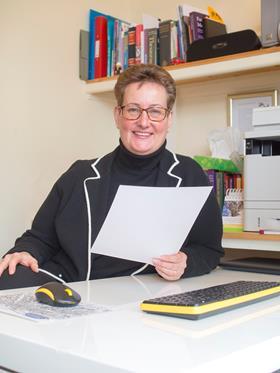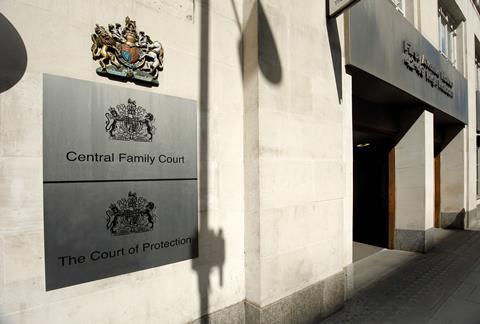With family courts in disarray, clients can resolve their disputes more quickly and cost effectively through arbitration. Rachel Rothwell reports on how ‘going private’ is attracting high praise from solicitors
The low down
Families are facing long delays for a court hearing to deal with questions such as where a child should live, what contact they should have with a parent or where they should go to school; with many hearings being cancelled at the last minute. As a result, clients are increasingly ‘going private’, resolving issues through family arbitration. With legally binding decisions being made swiftly by qualified arbitrators who are experienced in their field, in the comfortable setting of a barristers’ chambers or solicitors’ office, family arbitration is proving popular with both lawyers and clients. And as the cost of litigating in the family courts has risen along with waiting times, a fixed-fee arbitration is an increasingly appealing option, even if takeup so far has been slow.
A mum faces an 18-month wait for the court to rule on whether her child can go to a new school – but term starts in September. A dad’s year-long wait for a hearing about access rights is cancelled at the last minute – so he has to join the back of the queue. A lawyer talks in hushed tones to an emotional client in a corridor outside the toilets, because there is no private meeting room.
Welcome to the family courts.
Speak to any family law solicitor and they will tell you that the family law system is broken. It is not just the dismal state of court infrastructure since the sell-off of the court estate began in 2010. Delays are getting longer and there has been a marked rise in the number of listed hearings being cancelled. And private law family matters – about where a child should live, what contact a parent should have with them, how assets should be shared out – are constantly being bumped from the court list because the judge needs to deal with an urgent public law case, for example deciding whether a child should be taken into local authority care.
No one would question the need to prioritise urgent public law cases where the safety of a child is at stake. But it is easy to underestimate the emotional toll that these long delays in private law cases have on family members, whose lives are on hold while they await a decision from the court. So is there a better way? Apparently so. It is called family arbitration – a concept with a rapidly growing fanbase among the legal profession and their clients.
Going private
So what precisely is family arbitration, and how does it work? In the same way that you might choose to have your knee operation performed privately to avoid a long wait on the NHS, arbitration is essentially a way of ‘going private’ for your legal case. And just like private healthcare, it is very much quicker, and takes place in more comfortable surroundings, than the state-funded option.
Both parties must agree to resolve their dispute by arbitration before it can be deployed. But once they have entered into the process, the arbitrator’s award or determination will be legally binding on the parties; it will be drafted into a consent order and approved by the court. So arbitration should not be confused with mediation, where the parties negotiate and reach an agreement with one another. In arbitration, the arbitrator essentially acts as a judge.
Lawyers who have been involved in family arbitration, either as arbitrators or representing clients, are overwhelmingly positive about it.
‘I have no reservations about arbitration,’ says Resolution chair Juliet Harvey. ‘It’s really positive, and I’m using it more and more given the sorry state of the courts at the moment. Within the last hour, I’ve just agreed to arbitrate on a case that otherwise would not have been going for a final hearing until next year. Instead, we’ll be able to arbitrate this summer. So we’ve saved the couple at least six months of waiting for that case to get into court.’
Arbitration has been available for the financial side of family disputes since 2012, when the Institute of Family Law Arbitrators (IFLA) launched a set of arbitration rules in a collaboration between Resolution, the Family Law Bar Association (FLBA), the Chartered Institute of Arbitrators (CIArb) and the Centre for Child and Family Law Reform.
'I have no reservations about arbitration. It’s really positive, and I’m using it more and more given the sorry state of the courts at the moment'
Juliet Harvey, Resolution
Tony Roe, partner at Dexter Montague in Reading, is qualified as a family arbitrator for financial disputes. He explains: ‘Arbitration won’t be suitable if you need to get evidence from third parties, or if there’s a concern that a party might try to hide assets, or if you want a freezing order. But otherwise, arbitration is a genuine alternative to going to court for most family cases.’
In 2016, IFLA published further rules, allowing arbitration to expand into children disputes. It can resolve issues such as where and with whom children should live; time spent with parents; arrangements around a child’s upbringing; and even the relocation of children within England and Wales, or to ‘Hague’ countries. But it is not used for public law cases, or private law disputes where there are allegations of abuse or other safeguarding issues.
Regarding children, arbitration is especially effective where there is a single, discrete issue that must be resolved within a set timeframe, such as decisions over whether a child can attend a certain school, or whether one parent can take them abroad on holiday. An arbitration can be scheduled for as soon as the arbitrator has space in their diary; and the process is completely bespoke, tailored to fit the precise needs of the parties. Arbitrators usually hold an initial ‘planning meeting’ – or as lawyers may prefer to call it, ‘directions hearing’ – with the parties’ legal advisers, to decide how the case will be run. This first meeting will often be virtual, but the main hearing can be in-person, virtual, or even on the papers, depending on what the parties want or the arbitrator thinks will work best. Once the hearing has taken place, an arbitrator will often give their decision within days.
Jo O’Sullivan, founder of O’Sullivan Family Law in Sussex and author of the book (Almost) Anything But Family Court (see Reviews, p32), suggests that arbitration is a much better experience for clients than going to court. ‘With arbitration, you’ve got completely gold-plated service,’ she enthuses. ‘You have someone [the arbitrator] who’s read all the papers; who will probably write up the reasons for their award or determination; they will talk to your client; they will talk to you. They will probably be quite inquisitive about things, and people will feel that they have been part of the experience – which I don’t think people at court do.’
‘Arbitration can be cheap as chips’
Family arbitration may take place in luxurious surroundings, but is there a price tag to match? Arbitrators normally work for a fixed fee. There are no set figures, but typical fees are around £3,500 for a solicitor, a little over £4,000 for a junior and around £5,000 for a silk. Those with cash to splash who desire a Rolls-Royce service could opt for a retired judge and pay an awful lot more. The cost of the arbitrator is normally split between the parties, who must also pay their own lawyers. So is this affordable?
‘I say it’s cheap,’ insists Jo O’Sullivan, founder of O’Sullivan Family Law. ‘The court process is now such that people are having all these last-minute postponements. People are paying to brief counsel, they’re paying to update their information and get ready for the court hearing… It can cost many thousands of pounds to get to a hearing, and if that doesn’t happen, that’s all wasted. And then the hearing gets set another date, and you start again.

‘It really annoys me when people say, “there’s not enough money here for arbitration”. I think, rubbish. If there’s enough money to deal with the court using solicitors, there’s enough money for arbitration. It’s ideal for unbundled services as well, it doesn’t have to be extensive. You could have an arbitration done on the papers for £1,500+VAT - that’s cheap as chips.’
Tony Roe (pictured), partner at Dexter Montague, says: ‘If you’re litigating, it’s rare that nothing happens from the point of issuing your “Form A”, which is the application form that kick-starts financial remedy matters, until the first directions appointment. The clock is ticking whenever work is being done. So you’ve got ongoing costs for a period of six, nine, 12 months, for both sides. If you can avoid that sort of delay and get an arbitration in sharpish, you can save quite a lot of money.’
On a practical note, arbitration hearings take place in much more comfort than at court. Elizabeth Isaacs KC, head of St Ives Chambers in Birmingham, sits as a part-time judge in children cases and is also a qualified children arbitrator. She says: ‘The selling off of the court estate has had the most dramatic effect on practising law. You have some magistrates’ courts where the lift doesn’t work, there’s no drinks machine, no robing room – it’s grotty.’
In contrast, arbitration takes place in the far more pleasant environs of a barristers’ chambers or solicitors’ office. ‘This makes it much less stressful for the parties – the chairs aren’t nailed to the floor, and the parties have [the arbitrator’s] undivided attention all day,’ says Isaacs. ‘It’s like the luxury end of being a judge. You don’t have the court staff coming in to say, “your honour, can you deal with this emergency situation”. There’s a start, a beginning and an end.’

Harvey adds: ‘In the courts, you can’t always guarantee that you’ll have a private room to talk to your client; whereas at an arbitration, you will have private rooms and comfortable surroundings. That actually reduces a lot of stress for the client. Court meeting rooms are horrendous; or you have to have discussions with your client in the corridor outside the toilets. It’s not nice for clients. But with arbitration, you know you don’t have to worry about that.’
Harvey notes that another appealing aspect of arbitration is the guarantee of privacy. ‘Historically, family financial cases weren’t reported… But now there’s a much greater [pressure] on judges to publish a proportion of their judgments. So it could be that a reporter wants to sit in (with the judge’s permission), or the judge releases the judgment with suitable anonymisation – but it could be that the couple find their financial details are laid bare. We’ve seen that with celebrities over the years; it doesn’t take much to work out who it is. Whereas arbitration is completely private.’
On the flip side, as arbitration proceedings are not made public, they do nothing to contribute to developing case law in the family arena – unless they are the subject of an appeal. In 2020, the Court of Appeal in Haley v Haley [2020] EWCA Civ 1369 confirmed that arbitral awards can be appealed on the same basis as a court judgment.
To be a family arbitrator, lawyers need at least 10 years’ experience in the relevant discipline, must undergo specialist training and must be members of CIArb. They can qualify as arbitrators for children matters, financial matters, or both.
One big advantage of arbitration over the courts is that the parties can choose their arbitrator. But if they cannot agree, they can ask IFLA to find an arbitrator for them; or to choose from an agreed shortlist of three, for example.
'With arbitration, you’ve got completely gold-plated service.You have someone [the arbitrator] who’s read all the papers; who will probably write up the reasons for their award or determination'
Jo O’Sullivan, O’Sullivan Family Law
Suzanne Kingston was one of the first accredited family arbitrators in England and Wales and is qualified to arbitrate in both financial and children work. She wrote the family law arbitration course and has trained many arbitrators. She says: ‘I feel we’ve got a very strong pool of arbitrators both in finance and in children, so there’s a lot of choice for clients: whether they want retired judges, KCs, barristers, solicitors… I think that’s what has set us apart from a worldwide perspective. We have a very streamlined system that is probably the envy of lots of other jurisdictions.’
The ability to choose one’s arbitrator could, however, prove a double-edged sword. Some solicitors may be deterred from pointing clients towards arbitration because they worry that if the result goes the wrong way, the client may turn around and blame them for recommending it – or for proposing that particular arbitrator.
O’Sullivan says: ‘Solicitors can be worried that if an arbitrator goes against their client, they will be blamed. But then I would say, go to IFLA and they will appoint someone for you, it doesn’t have to be your choice…
‘You [need to] look after yourself and you say, “we’ll go through IFLA”, or “here’s the list of all the people in this country who do [family arbitration]”. You can say that you’ve worked with this person previously and you thought they were good and efficient, but you can’t guarantee the result. But of course you can’t guarantee the result in court either.’
Are there other factors that might be deterring solicitors from guiding clients towards arbitration? O’Sullivan says: ‘Going to court is predictable, there are rules written about it, there are [books] about it – we know what we’re doing when we go to court. The court sets a deadline, the court is seen as being in overall charge of everything. I think solicitors and lawyers in general do like rules. They think, “I know where I am with that. They’re going to be in charge, not me”.
‘Of course, an arbitration can be as formal as that if you want it to be; or it can be just on the papers – I’ve done several of those, with no hearings at all. But I wonder if the bespoke nature of arbitration is what’s putting practitioners off.’

On the rise
Despite the numerous benefits of arbitration and the palpable enthusiasm among lawyers who have tried it, the number of family arbitrations thought to have taken place so far is relatively small – perhaps as low as around 300 in total. IFLA has recently begun requiring arbitrators to notify it when they conduct an arbitration, so a clearer picture of the numbers will emerge.
But why is the takeup not higher? This is a question that has puzzled Isaacs: ‘When I trained as an arbitrator two years ago, I expected a steady stream of work. But only one arbitration has come to fruition… I think the problem is partly about education. For example, [lawyers may not be aware that] the law has changed in the last two years, so that you can appeal.’
Isaacs adds that while there is support for family arbitration from the president of the Family Division, there is not enough ‘active promotion’ in the lower courts to increase parties’ awareness of the option of using arbitration at the stage where cases are allocated.

Arbitration does have one big weakness, however: both sides must agree to it. There will often be times when it is in one party’s interests not to arbitrate, with long court delays being to that party’s advantage. Take, for example, a residency dispute in which one parent wants to relocate with their child from Cornwall to Suffolk, in time for the new school year; while their ex-partner, who has visiting rights, disagrees. This ex-partner is unlikely to agree to arbitrate, even though it may be in the child’s best interests to have the matter resolved swiftly.
For Isaacs, there is an argument for making arbitration compulsory subject to some exceptions, for example where couples can show why the case is not suitable. ‘There’s an army of recorders and part-time deputy district judges who are ready and able to do the work,’ she insists. If most straightforward private law cases were dealt with through arbitration, this would free up the courts for cases involving a child’s safety, or allegations of domestic abuse.
But even if family arbitration is not made compulsory, it looks set to become increasingly mainstream. Harvey predicts: ‘It will continue to grow, and we know that the government is very keen on [ADR].
‘If you’re talking about an average case – a couple with a “two up, two down”, a car, a dog and a couple of children… That’s where I think arbitration will really take off; in this low-to-middle asset type of case. It really sits well, because it can deal with things relatively cheaply, and quickly.’
Roe adds: ‘There are a lot of cases that arbitration could apply to at the less complex and lower end of the scale. It’s not just for oligarchs – it’s suitable for all sorts of ordinary people with difficult matrimonial matters who want to be able to get on with their lives sooner rather than later.’
Rachel Rothwell is a freelance journalist
































2 Readers' comments